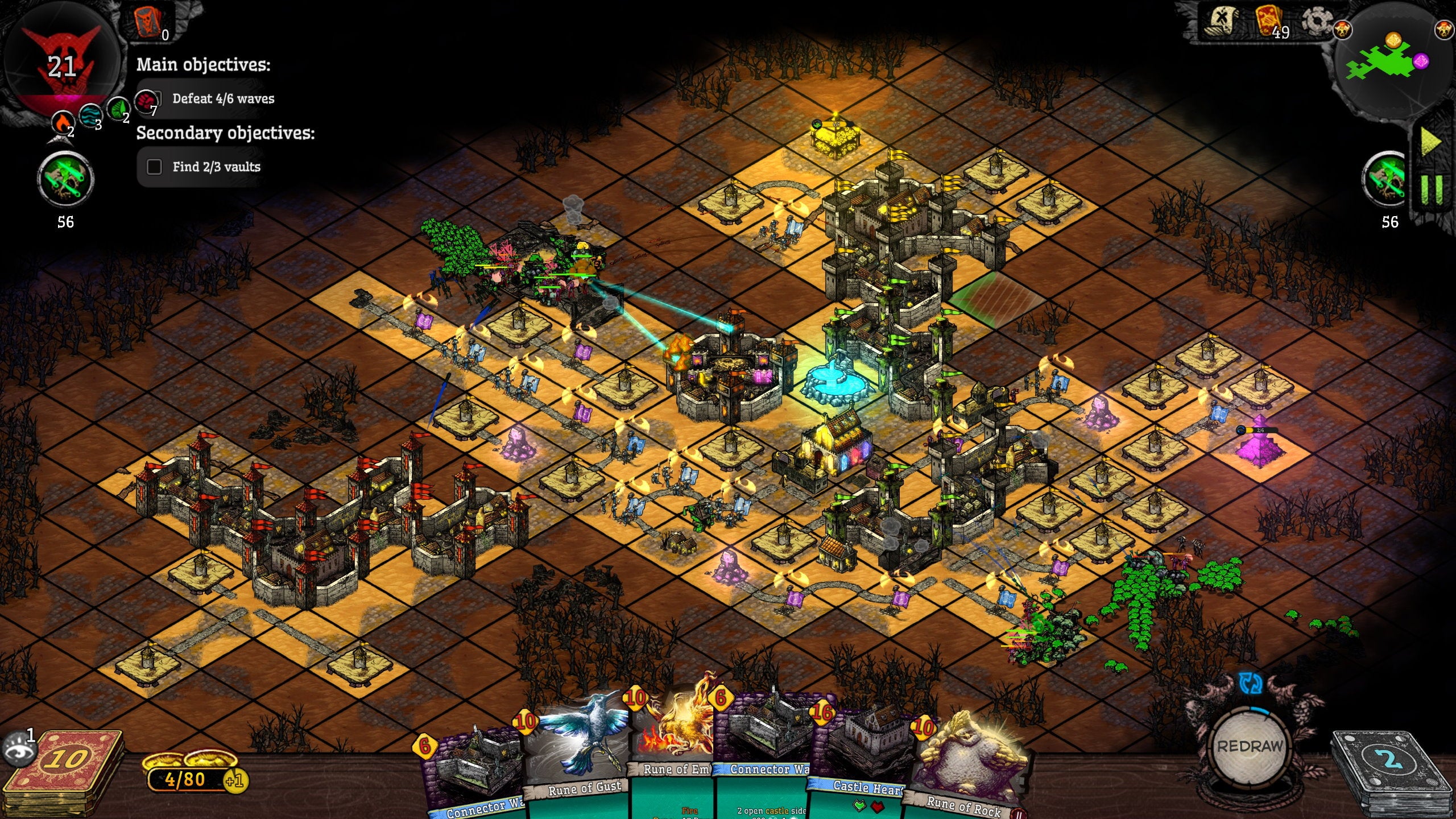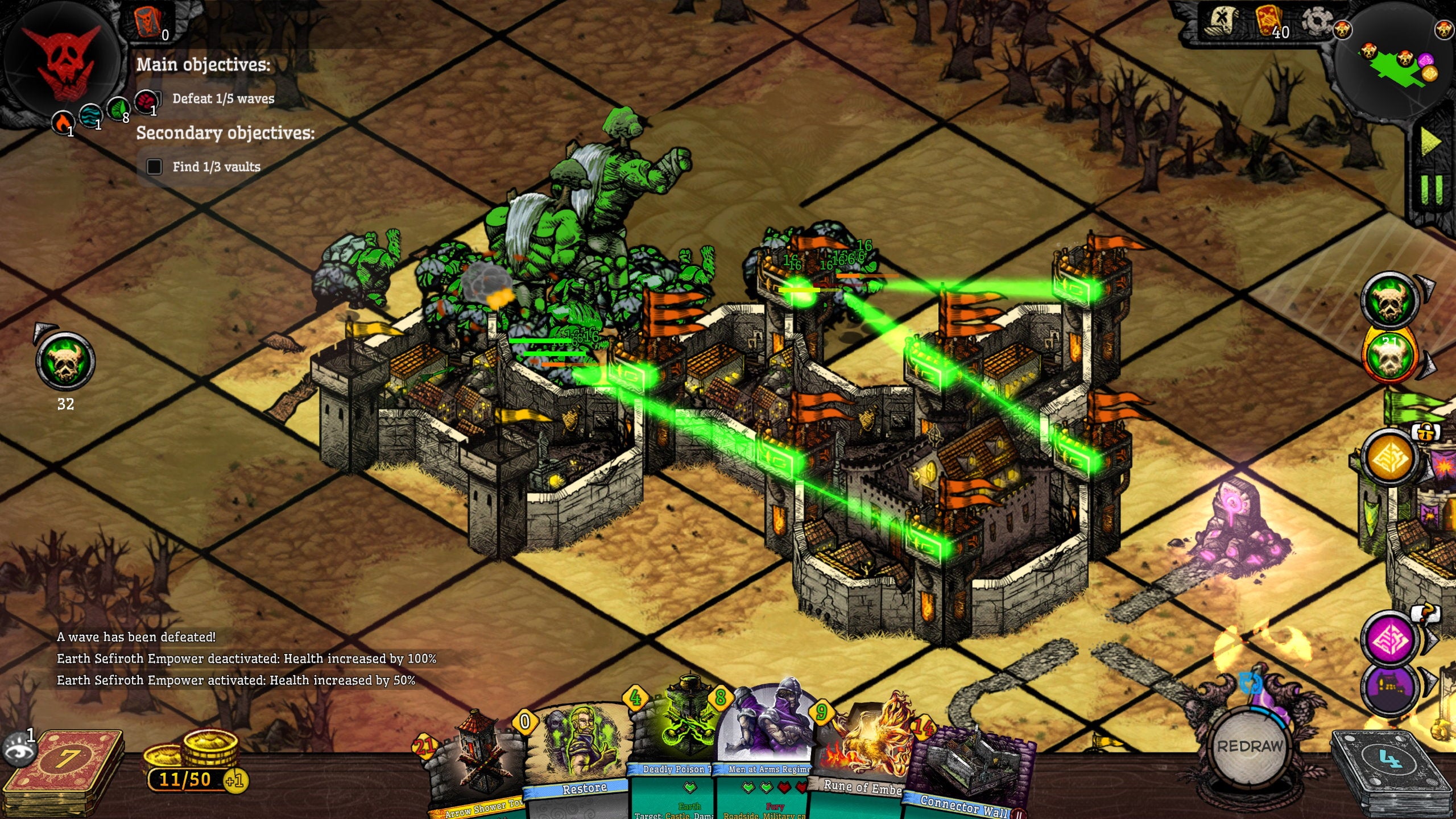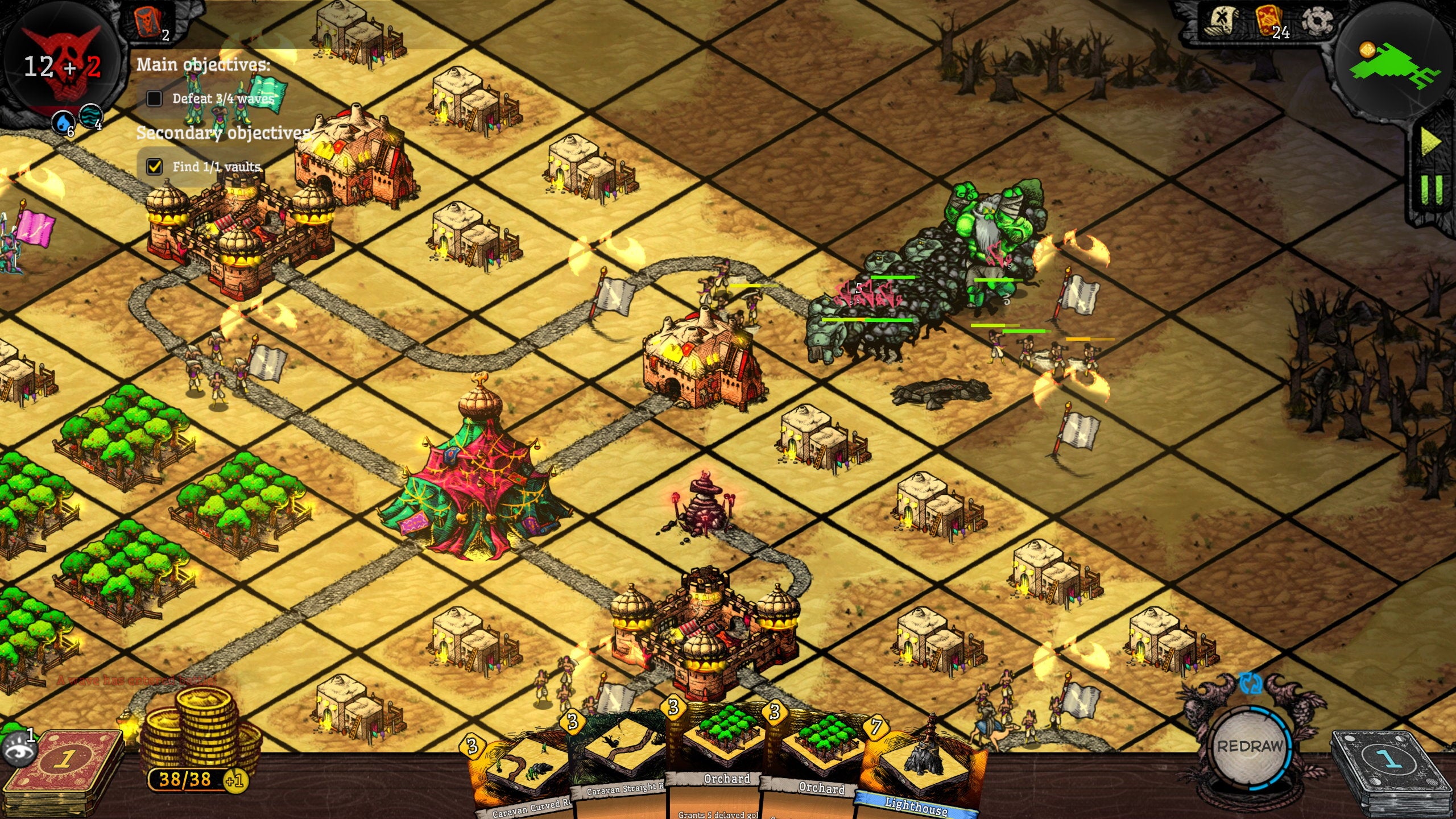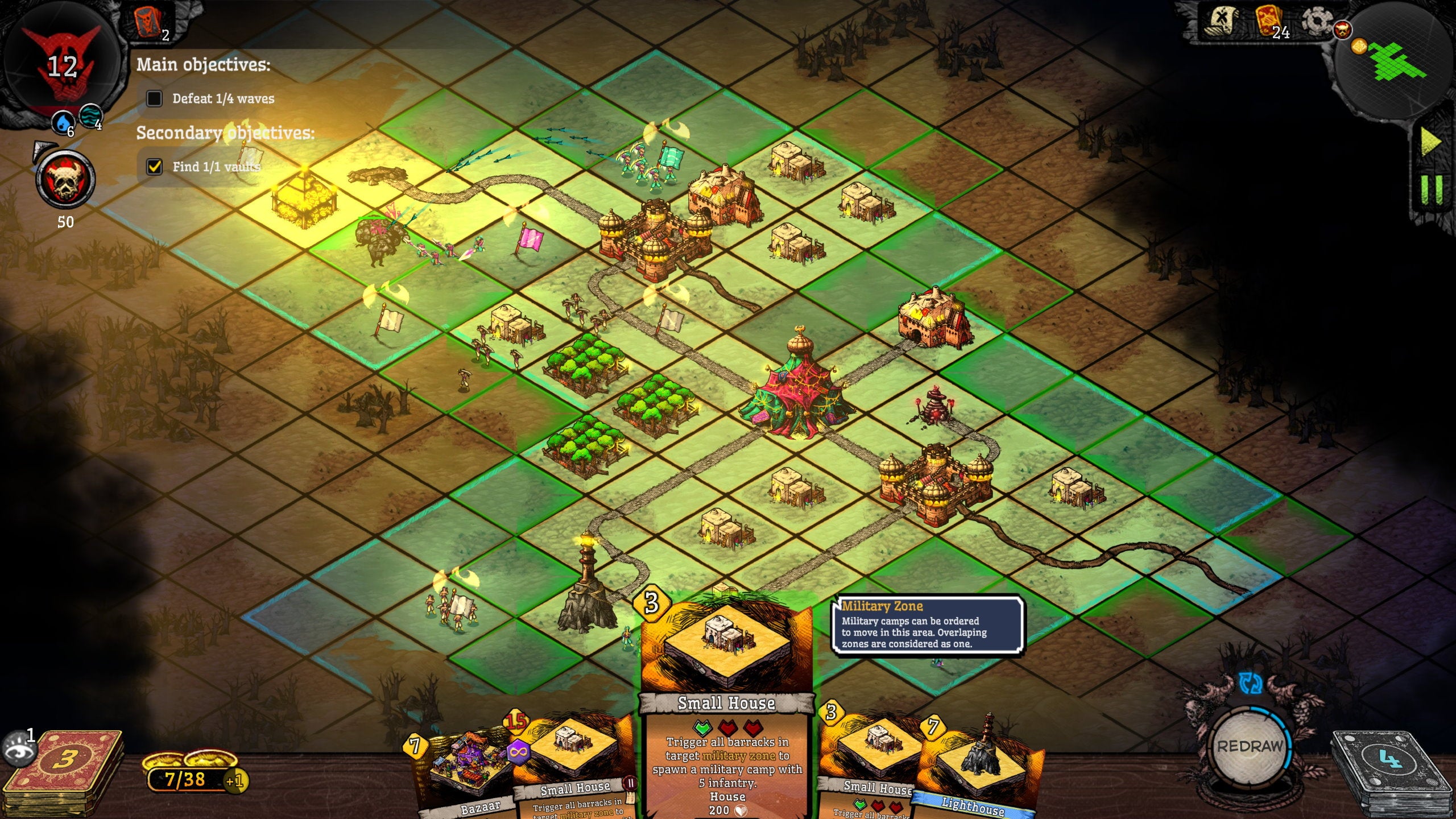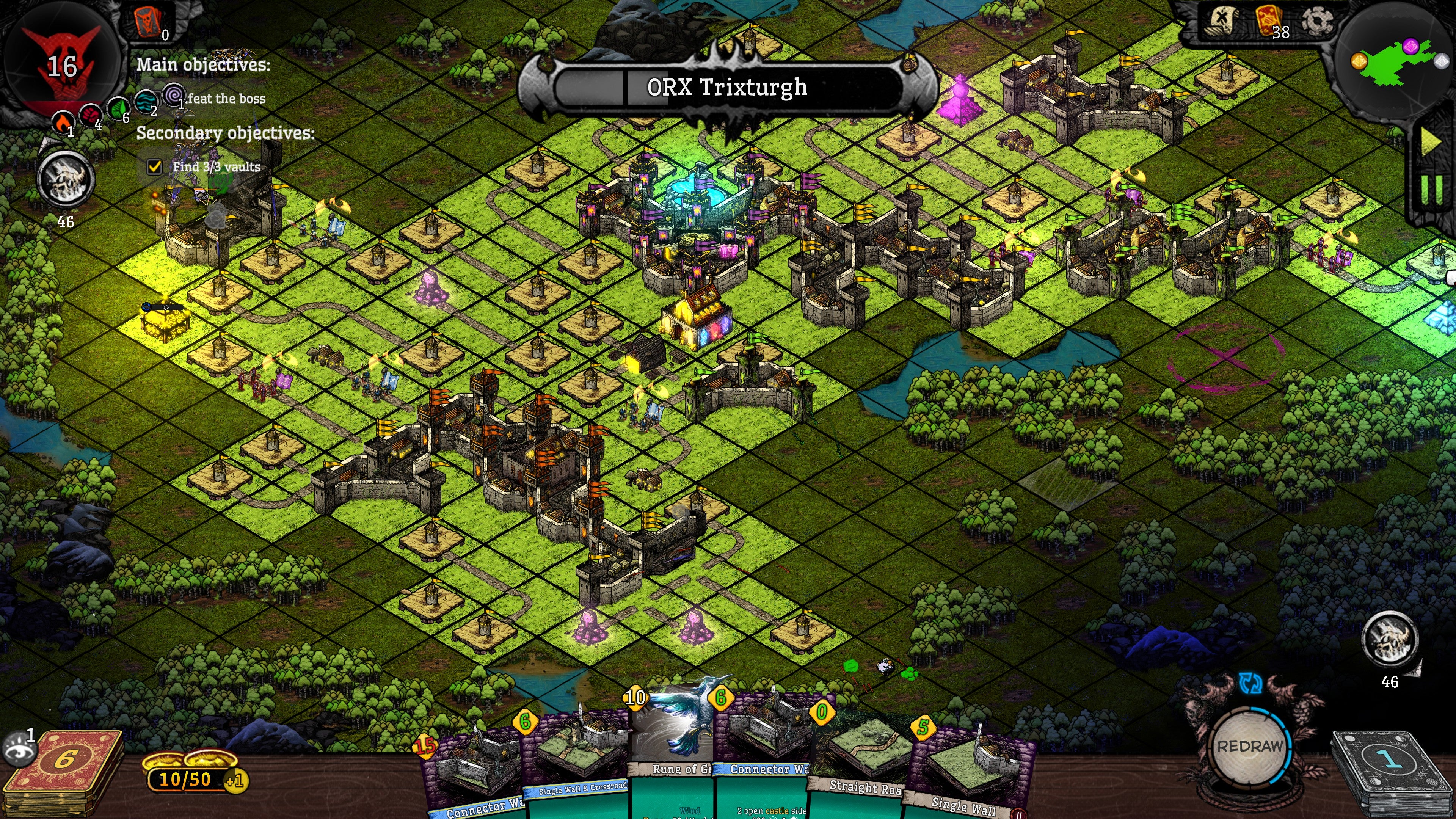Launching today with two of its four planned campaigns, ORX’s early access release lets you choose between the traditional castle-building Rune Wardens and the desert-dwelling Dune Reavers, the latter of whom offer a rather more interesting, if somewhat abstract take on tower defence by ditching the towers completely for roving squads of warriors. Both have their own meaty, four-act campaign to dig into, with each act being split into roughly three core battles that are topped by a challenging boss encounter. Developer Johnbell haven’t revealed what the other two factions are going to be just yet, but even if we don’t find out until the game’s proper launch in roughly a year’s time, ORX is in fine shape as it is, with its current pair of factions offering more than enough depth and challenge for the months ahead.
As you’d expect for a tower defence game, players must use their cards to build up their defences and protect their keep from multiple waves of orcs. If the orcs break through and destroy your keep, it’s game over. Thankfully, death doesn’t necessarily mean the end of a whole run here. While you can choose to fully abandon your run if the cards just aren’t flowing in your favour, you can also attempt a mission as many times as you like - a relief, as it not only helps take the pressure off being dealt a bad hand at the start, but it also feeds into that ‘one more round’ mentality that’s made so many of my evenings disappear in a puff of smoke recently.
If you’re playing as the Rune Guardians, those defences mainly take the form of castle walls, which you’ll need to combine in various shapes and sizes to form proper towers. Spells can be added to these castles to help increase their attack speed and overall power, as well as different types of turrets to slow the orcs’ advance. Small squads of soldiers can also be deployed to stem the tide further, but they only operate in a small range of tiles, so you’ll need to pay close attention to where the next wave of orcs is coming from to make the most of them.
The Dune Reavers, meanwhile, are all about feeding their barracks buildings with a steady stream of houses. Place a house inside a barracks’ designated military zone, for example, and it will spawn a squad of soldiers nearby. Military zones can also be extended by building roads and placing down lighthouses, and you can beef up certain squads by training them in specific weapons, such as spears or archery. The random placement of these armies makes them a little more chaotic and unpredictable than the Rune Guardians, and it did take me a couple of matches to fully understand how they work – mostly because my review build only tutorialised the Rune Guardians and not said nothing about how to play as the Dune Reavers.
Regardless of which faction you play as, though, you can’t do anything without a steady stream of cash, and I reckon both factions have just as many cards dedicated to generating gold as they do building defences. Each card has a certain cost attached to it, you see, and you’ll need to wait until your royal coffers are healthy enough in order to play them. However, your money reserves will only tick up one coin per second on its own, and that’s simply not quick enough when the hordes are bearing down on you.
Instead, the trick is to try and ensure you’ve got multiple coins coming in per second, and you could argue it’s here where ORX makes the leap from run-of-the-mill roguelike to a stonkingly good strategy game. Sure, slapping down a farm or a village on the end of a single crossroads card will generate some short-term cash, but if you build out that road to be four, five or even six tiles long? Now you’re rolling in it, my friend, as the long-term profits of those farm and village cards are all tied to road length.
Throw in the small wrinkle of only being able to place new cards next to tiles you’ve already played, and there’s never a dull moment in ORX. The flow of cards is constant, as you’re not only searching for ways to push forward and expand your territory to collect more gold, but you’re also looking to see what gaps you can fill at every opportunity, maybe adding a new wing extension onto that castle down south there, or snaking a road round the edge of one to the east to plonk down another farm to maximise your limited board space. Even when the action is paused while you’re deciding what card to play next, this is like a citybuilder on speed, elevating those familiar rhythms of bold exploration with the frantic, all-encompassing need to build, build, build whatever wild concoctions you can chuck together against the ticking of the clock. I’ve perhaps made it sound more stressful than it actually is, but trust me - while a lesser game could easily veer into being too overwhelming here, ORX channels every thought and feeling into slapping down bigger and better cards, and I have never felt more energised.
Between missions you’ll also be given the choice of either enhancing or modifying your deck with new or more powerful versions of cards you already own, either from your end of mission spoils, text-based story events, or by picking one of its dedicated upgrade nodes on the map screen. The latter is where its roguelike elements start to come through, as the upgrade path you choose shapes the kind of battle you’ll be facing next. Sure, its map screen (if you can even call it that) doesn’t offer as much variety or potential ingenuity as, say, your Slay The Spires or even your Cult Of The Lambs. Indeed, in its current state, players are limited to just two main progression prongs they can flit back and forth between at any time. For me at least, though, this wasn’t really an issue. I didn’t feel like I was lacking in options, and if nothing else, only having a handful of opportunities to make vital tweaks to my deck made me really focus in on what could make the biggest difference.
This might be levelling up one of my castle walls so it has substantially more health, for example, or upgrading my Dune Reaver’s orchard so it delivers more gold over a longer period of time. Equally, having a faster attack spell is always handy, or maybe I simply want to ‘favourite’ a card so it’s always at the top of my deck. Then again, upgrading existing cards often makes them more expensive to play, too, so maybe it’s better to go for quantity rather than quality.
It’s a very fine balancing act, and one you’ll need to measure against the cards that end up in the hands of the orcs as well. Yep, those green goblins have their own cards to use against you, and even worse, you have to pick the ones they get to play. Not sure how they managed to wangle that one, if I’m honest, but it all adds to the general chaos, challenge and volatility of any given run. It’s the kind of unpredictability I enjoyed so much in Warhammer 40K: Chaos Gate – Daemonhunters, as you never quite know what you’re going to be dealing with next – either in your hand or in the battle ahead.
Only one thing really cast a pall over my time with ORX, and that was related to how its campaign acts unlocked. This may be a result of having a constantly updated review build, but initially I had to play and complete each act multiple times before unlocking the next one, meaning I had to play Act 1 to unlock Act 2, for example, and then Act 1 and Act 2 together to unlock Act 3, and so on. I couldn’t just progress from one act to the next. Another update then had them all unlocked from the start, but then a third major update erased my progress altogether and went back to unlocking them individually. As a result, I can’t actually tell you how it’s going to function in the final early access build releasing today, although to be honest, I didn’t really mind having to a campaign four times over just to get to the end of it, as the thrill of the draw meant each successive run was just as gripping as the last. It’s why I’ve kept coming back to ORX ever since I first clapped eyes on it earlier in the year, and why I’m confident this roguelike-deckbuilding-tower-defence ’em up has a strong future ahead of it. Whatever luck throws its way, I have a feeling ORX is going to come up trumps every time.
